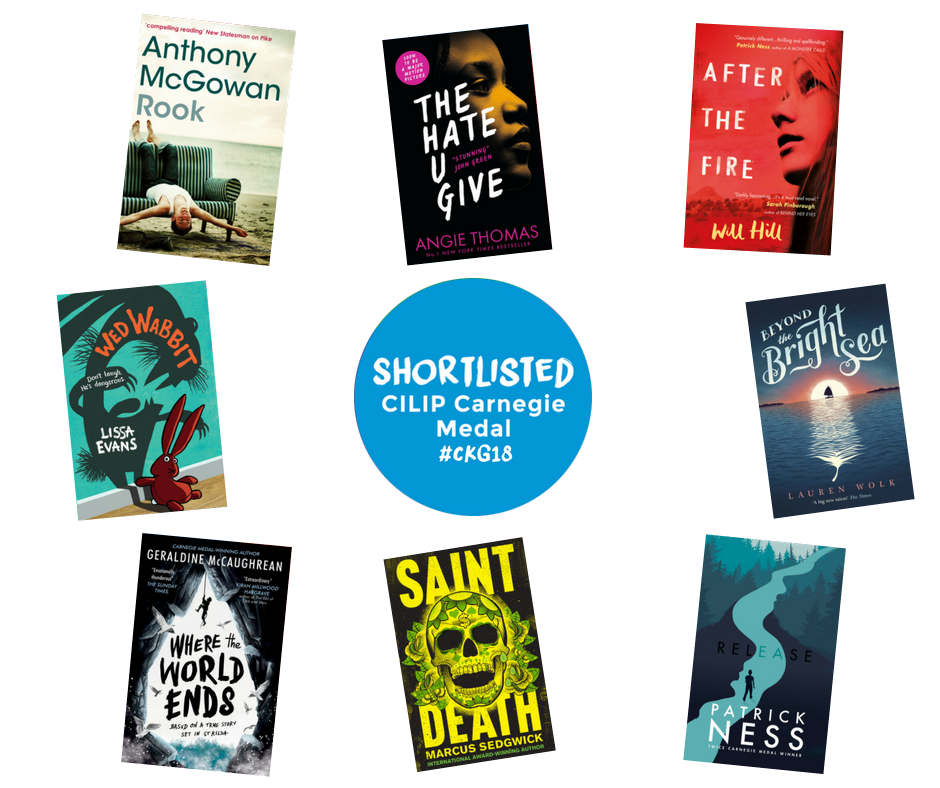This year’s Carnegie shortlist has been announced with schools and reading groups around the country shadowing the process and providing valuable feedback. Susan Elkin is our guide.
The CILIP Carnegie Medal, awarded annually for a children’s book, is the prize that most authors writing for young people covet above all others. The judges are librarians from all over the UK – people who approach the task from a highly informed and experienced position. They are totally on top of what makes a book worthwhile. Passionate readers themselves, they also know the children and young people who use their libraries very well.
They approach the task with impressive seriousness too. I was, a few years ago, several times invited to sit in on part of the shortlisting process and I marvelled at the depth of the discussion and the time generously given to every single title on the long list.
All this means the authors whose books are shortlisted – and the one who ultimately wins – know that their work is highly valued by professionals who really know their business and that counts for a lot.
Ruth Sepetys was last year’s Carnegie winner for Salt to the Sea (Puffin) which is a historical novel for young adults about four individuals in East Prussia in 1945. In pursuit of freedom they are trekking towards the ill-fated ship MV Wilhelm Gustloff. This year’s winner will inevitably be utterly different. The 2016 winner was Sarah Crossan for One which is a first-person narrative about conjoined twins written in verse. It’s a prize with enormous, eclectic potential. There is always a huge range across the shortlist and this year’s is as varied as ever. Even the age range is fluid from books for under 11s through to titles for young adults. See box below for the 2018 list.
The Carnegie Medal was set up in 1936 in memory of the great Scottish-born philanthropist, Andrew Carnegie (1835-1919) and the first one was awarded to Arthur Ransome for Pigeon Post. Since then it has been won by authors such as C.S. Lewis, Margaret Mahy, Noel Steatfeild, Sally Gardner, Penelope Lively, Terry Pratchett, Philip Pullman and Patrick Ness.
Theoretically it can be awarded for a non-fiction title although it hasn’t been for many years. And in the early days there were one or two occasions when the award wasn’t made at all because the judges decided that none of the submitted books was worthy of the honour.
And that’s all it was – an honour. For a very long time there was no cash prize although winning the Carnegie drove up book sales and raised the author’s profile. Today (since 2016) the winner of the Carnegie Medal also gets the Colin Mears Award which carries a cash prize of £5,000. And he or she wins £500 worth of books to be donated to a library chosen by the winner.
Once the shortlist is announced, usually in March, hundreds of schools take part in the shadowing scheme which encourages young readers to read and respond to the books from which the winner will be chosen. Not only does it promote reading but it makes participants feel involved.
Sponsored by ALCS (Authors’ Licensing and Collecting Society), The Carnegie Medal is run by the Chartered Institute of Library and Information Professionals which is why its full name is CILIP Carnegie Medal. In tandem with it, CILIP also manages the Kate Greenaway award for an illustrated book. That is judged with similar systematic care.
Last year an additional award was announced: Amnesty CILIP Honour. This is judged by a separate panel convened by Amnesty International and its aim is to raise awareness of human rights. One book from the Carnegie shortlist and one from the Kate Greenaway is awarded a special commendation for its stance on human rights.
Shadowing
The CILIP Carnegie shadowing website is open throughout the year. You can sign up as a group leader at any time to explore the website and resources most useful for your reading group.
The core shadowing activity takes place between the shortlists’ and winners’ announcements each year. Following the announcement of the shortlists, all features, functions and book information is updated on the website to reflect the new shortlist.
Participating groups have access to a wide range of resources provided by CILIP.
A 2013 Open University study by Joan Swan and Teresa Green found that Carnegie/Greenaway shadowing to be “an excellent way of encouraging reading for pleasure in young people and highlighting the unique role librarians play”.
www.carnegiegreenaway.org.uk/shadowing.php
2018 CILIP Carnegie shortlist
Wed Wabbit by Lissa Evans (David Fickling Books)
After the Fire by Will Hill (Usborne)
Where the World Ends by Geraldine McCaughrean (Usborne)
Rook by Anthony McGowan (Barrington Stoke)
Release by Patrick Ness (Walker Books)
Saint Death by Marcus Sedgwick (Orion)
The Hate U Give by Angie Thomas (Walker Books)
Beyond the Bright Sea by Lauren Wolk (Corgi)
The winners of the 2018 CILIP Carnegie Medal and Kate Greenaway Medal will be announced on 18 June.



